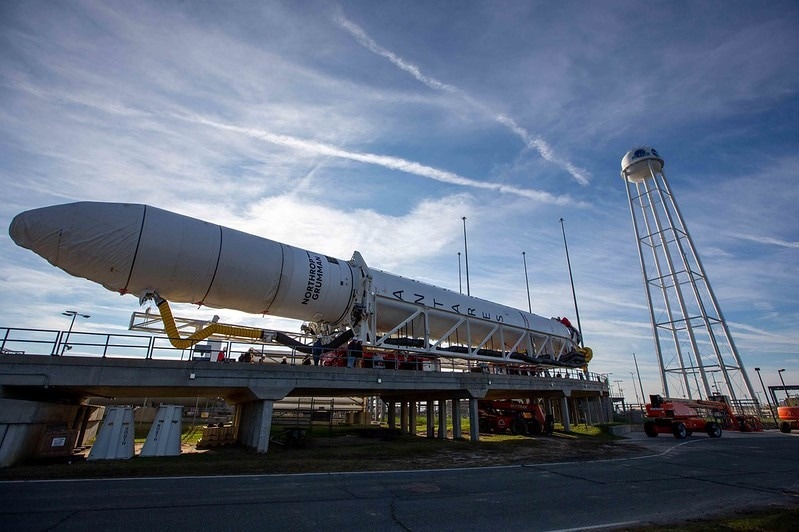A diverse set of payloads is slated to launch to the International Space Station (ISS) onboard Northrop Grumman’s 19th Commercial Resupply Services mission contracted by NASA. Among the more than 8,200 pounds of critical research and supplies are three projects funded by the U.S. National Science Foundation (NSF) and sponsored by the ISS National Laboratory. Additional payloads sponsored by the ISS National Lab on the mission include biomedical investigations, research from companies to enhance their products, and projects to validate new capabilities for space-based research. This mission is scheduled to launch from NASA’s Wallops Flight Facility in Virginia no earlier than 8:31 p.m. EDT on Tuesday, August 1, 2023.
 A Northrop Grumman Antares rocket carrying a Cygnus spacecraft loaded with cargo on Nov. 2, 2022, at NASA's Wallops Flight Facility. MEDIA CREDIT: Image courtesy of NASA
A Northrop Grumman Antares rocket carrying a Cygnus spacecraft loaded with cargo on Nov. 2, 2022, at NASA's Wallops Flight Facility. MEDIA CREDIT: Image courtesy of NASA
To date, NSF has funded 20 projects that have launched to the orbiting platform under the sponsorship of the ISS National Lab. These projects stem from annual calls for proposals in tissue engineering and transport phenomena disciplines. Below outlines the three projects that are flying through NSF-funded grants on this mission:
- A team from Emory University will continue research examining how microgravity affects the growth and function of heart muscle cells as they mature into tissue-like structures. Findings will help advance cardiac disease modeling and could lead to the development of new therapies to treat heart disease in patients on Earth.
- An investigation from Rensselaer Polytechnic Institute (RPI) aims to improve the efficiency of heat transfer devices used in various technologies, from laptops to large telescopes in space. As electronics continue to shrink in size, they generate more power, resulting in the need for more efficient means of cooling. This experiment will test new ways of diagnosing heat pipe malfunctions, which could lead to improved heat transfer devices.
- Researchers from Stanford University seek to compare graphene aerogels (extremely lightweight solids with high porosity) produced on Earth and in microgravity. The study will investigate the effects of microgravity on the growth process and the final material properties of aerogels. They expect the microstructure to be more uniform in the microgravity samples, with improved strength and material properties. Results from this investigation could lead to improved thermal insulators for use in heat management applications, and the high surface area makes them promising for energy storage (e.g., batteries, supercapacitors) and sensing (e.g., gas sensing) applications.
“This longstanding partnership gives talented scientists and engineers from across the country unparalleled access to a one-of-a-kind research environment,” said NSF Director Sethuraman Panchanathan. “The unique conditions on the space station provide an exciting and innovative solution to research challenges here on Earth, enabling critical new insights faster than ever before.”
Additional ISS National Lab-sponsored research on this mission includes a project from Axonis, a biotech startup, that seeks to test an accelerated model of neurological disease in hopes of creating therapeutics to combat similar diseases in the future. Also, Sierra Space and BioServe Space Technologies will partner with the Mayo Clinic to validate the in-space production of hematopoietic stem cells (HSC) obtained from umbilical cord blood. Successful implementation of this project will lay the groundwork for future stem cell in-space production applications research.
Tec-Masters will use this mission to validate the capabilities of the Microgravity Research for Versatile Investigations (MaRVIn) facility. This facility will serve as an experiment processing system to support future physical science investigations.
These are just a few examples of investigations sponsored by the ISS National Lab that are set to launch on this mission. In the coming days, the ISS National Lab will put out a variety of press releases highlighting projects launching onboard the Northrop Grumman Cygnus spacecraft.